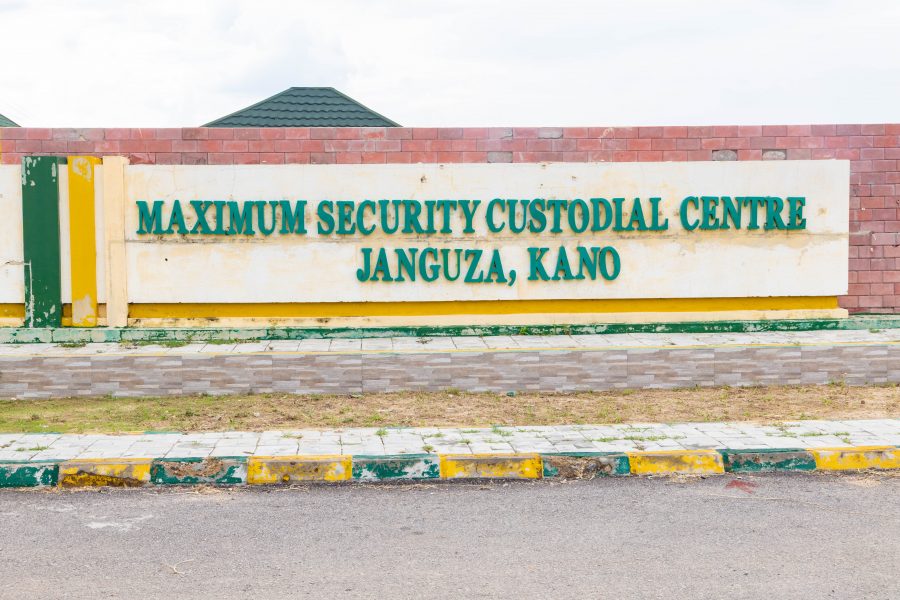
Mahdi Garba (Lead writer)
Kabiru Tanko (not his real name) was among the inmates moved from the dilapidated Kurmawa Custodial Centre to the newly built Maximum Security Custodial Centre in Janguza, Kano, in May 2025. Since the relocation, Tanko says, many prisoners have developed urgent health needs that require prompt medical attention. “On several occasions I have come to the clinic to receive care close to ten times,” he recalled. Tanko, is one of more than 3,000 inmates now covered by the Kano State Contributory Healthcare Management Agency (KSCHMA). He says he no longer fears visiting the prison clinic.
Kano is home to 4,676 of Nigeria’s 79,470 inmates as of September 2025. The Kurmawa Centre built in 1910 under British colonial rule has long been in poor condition. The state government recently announced plans to convert it into a museum and about 300 prisoners were moved in the process.
Bringing health behind bars
Dr Rahila Mukhtar Aliyu, executive secretary of KSCHMA, says the idea to extend health insurance to inmates came when she led her team on an outreach to a prison facility.
During that visit, the team discovered that many of the inmates had chronic skin conditions, diabetes, hypertension and some had open wounds that had not received medical attention. It was there that she saw the magnitude of the problem and proposed enroling them under KSCHMA’s equity programme.
Before commencing, the state’s insurance agency contracted a consultant dermatologist to treat roughly 300 inmates with scabies. When Dr Aliyu briefed the Commissioner of Health on the inmates’ conditions, he advised seeking clearance from the federal government. Through the Kano State Coordinator of the National Health Insurance Authority (NHIA), she secured approval to proceed with enrolment.
Dr Aliyu says the monthly capitation paid to the prison clinics is allocated 70% for medication and 30% for basic equipment like thermometers, detergents and other materials to maintain the sanitary conditions of the clinics. For each inmate, KSCHMA pays ₦570 every month as capitation.
The Nigerian Correctional Service (NCS) confirmed that inmates across Kano’s 10 satellite prisons have been enrolled in the state health insurance scheme. Coverage varies by facility: Goron Dutse Custodial Centre has achieved about 45% enrolment, while Kurmawa Custodial Centre stands at 50%.
The law establishing the Kano State Health Trust Fund (KHETFUND) requires that 2% of its revenue be allocated to the equity programme and transferred to KSCHMA. Dr Aliyu explained that as long as KSCHMA and KHETFUND remain functional, the state’s health insurance scheme can remain sustainable.
Dr Aliyu added that even if a prisoner is discharged from the correctional facility, they can still benefit from the insurance in a health facility close to them, adding that enrolment is intended to be lifetime: “As far as the agency is still in existence, a prisoner that has been enrolled will be able to benefit from the programme.”
‘We lost some patients because of lack of medical treatment’
Dr Kamdip Binven Nanring, deputy controller of corrections for the Kano and Jigawa command medical unit, described the provision of KSCHMA’s health insurance to inmates as a breakthrough. “We lost some patients because they did not receive timely medical treatment,” he said.
Image credit: Nigeria Health Watch
He called KSCHMA’s insurance “a great relief” for the NCS health system and its inmates. “Before now, whenever we referred cases to any [secondary] hospital, it was a very Herculean task because there were no funds, and the costs had to be paid out-of-pocket, either by the NCS or by the inmates’ relatives,” he revealed.
Fatima Jubrin, a nurse at the Maximum-Security Custodial Centre clinic in Janguza, highlighted that the enrolment of inmates by the KSCHMA on the health insurance has improved how they provide care to prisoners in the facility.
She recalled that prior to the coming of the state’s health insurance scheme, the clinic relied solely on the drugs that are sent to them from the NCS headquarters in Abuja.
Currently, the correctional centre receives medications and supplies from the NCS headquarters and now from the state’s insurance agency which has saved them from running out of drugs in the facility. She further stated that these drugs help them take care of 50 to 60 patients that come to the clinic to receive care daily.
Navigating the challenges
While the programme has brought relief to inmates, Dr Aliyu noted that most of the prisoners did not have National Identification Numbers (NIN). “If we waited for every prisoner to obtain a NIN, the process would take too long, she said
“So, we overlooked the issue of NIN and carried on with our enrolment,” she noted, adding that, “we have also encouraged the Comptroller to ensure that all prisoners are provided with NINs.”
She also cited security concerns, particularly after recent reports of jailbreaks across Nigeria. Because of this, officials were initially reluctant to allow KSCHMA staff into the facility to photograph inmates.
In Janguza, she observed that the medical equipment was outdated and not functioning. She said she has already begun discussions with the clinic’s management on plans to upgrade the facility to a secondary-level health centre.
On his part, Dr Nanring explained that when a new inmate arrives, enrolling them can be challenging because the process takes time. As a result, delays in capturing new inmates may prevent them from accessing the insurance benefits promptly. The medical doctor suggested that getting this enrolment exercise weekly or monthly may reduce these challenges.
To consolidate current progress, KSCHMA and KHETFUND should institutionalise transparent financial reports and accelerate NIN registration for all inmates to remove administrative bottlenecks. Sustained enrolment drives will also be essential to keep coverage levels stable. Ultimately, the longevity of this reform will depend on credible, independent monitoring mechanisms and a phased, well-costed plan to upgrade correctional health facilities. Without these structural commitments, health insurance for inmates risks remaining a promising but short-lived intervention rather than a meaningful, system-wide improvement.
